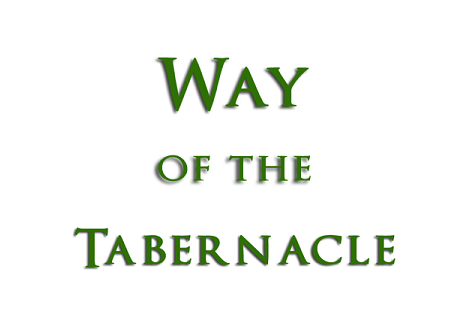The December 25th Lie
While many erroneously contend that the Bible is silent about the day of Christ's birth, even if that were true, the one day of the year we can be quite certain He wasn't born was December 25, as that is, historically, the date set aside for honoring the birth of the sun god, and because of other clues, such as the shepherds keeping watch over their flocks by night. That would not have happened during the month of December, as, in that region of the world, nighttime temperatures in that month average in the 40s.
But, looking at the chronology of events concerning John the Baptist's birth, we can ascertain on what day Christ was born. By this point in our exploration of spiritual truths, would it surprise you to know that it occurred during one of Yah's feasts? Well, it shouldn't.
First, we'll start with these scriptures concerning John the Baptist's parents, Zacharias and Elizabeth:
Luke 1:5 There was in the days of Herod, the king of Judaea, a certain priest named Zacharias, of the course of Abia: and his wife was of the daughters of Aaron, and her name was Elisabeth.
Luke 1:8 And it came to pass, that while he executed the priest's office before God in the order of his course . . .
Luke 1:23-24 And it came to pass, that, as soon as the days of his ministration were accomplished, he departed to his own house. And after those days his wife Elisabeth conceived . . .
The phrase “of the course of Abia” is important, as it identifies the priestly family to which Zacharias belonged; and, that is a key, as that determined when that family was responsible to serve in the temple. The family of Abia, or “Abijah,” is recorded as serving the second week of the third month, Sivan, from weekly Sabbath to weekly Sabbath. So, scripture records that John the Baptist was conceived shortly after the second week of the third month. That is vital, for scripture also tells us that Yahoshua was conceived in the sixth month of Elizabeth's pregnancy.
Luke 1:24-27 And after those days his wife Elisabeth conceived, and hid herself five months, saying,Thus hath Yah dealt with me in the days wherein he looked on me, to take away my reproach among men. And in the sixth month the angel Gabriel was sent from Yah unto a city of Galilee, named Nazareth, to a virgin espoused to a man whose name was Joseph, of the house of David; and the virgin's name was Mary.
Luke 1:36 tells us that this was the sixth month of Elizabeth's pregnancy, not the sixth calendar month of Elul. It is a common error to base the calculations on the month of Elul, rather than on the sixth month of the pregnancy. “And, behold, thy cousin Elisabeth, she hath also conceived a son in her old age: and this is the sixth month with her, who was called barren.”
Now, Mary stayed with Elizabeth for the last three months of Elizabeth's pregnancy until the time that John the Baptist was born: And Mary abode with her about three months, and returned to her own house. Now Elisabeth's full time came that she should be delivered; and she brought forth a son. Luke 1:56-57
Based on this information, and then advancing forward ten lunar months (40 weeks), we arrive at the middle of the month of Nisan. Why is this important? We have already seen earlier what occurs in the middle of the month of Nisan. Passover, the preparation day for the Feast of Unleavened Bread, is 14 Nisan. But, why is that significant?
Malachi 4:5 states, “Behold, I will send you Elijah the prophet before the coming of the great and dreadful day of Yah:” But, being written in the 5th century B.C., and the prophet Elijah living in the 9th century B.C., this was a prophecy that Elijah, who was taken from the earth by Yah before his death (2 Kings 2), would be sent back to earth to announce the coming of the Messiah. For this reason, Jews would set a place at the table during the Passover Seder and leave it empty, as an invitation for Elijah to come. They also left their doors open during the Seder for this reason (which is what Christ is talking about in Revelation 3:20, when He says, “Behold, I stand at the door, and knock: if any man hear my voice, and open the door, I will come in to him, and will sup with him, and he with me.” This refers specifically to a Passover Seder).
Christ explained to His disciples exactly who John the Baptist was in Matthew 17:10-13: And his disciples asked him, saying, Why then say the scribes that Elias must first come? And Yahoshua answered and said unto them, Elias truly shall first come, and restore all things. But I say unto you, that Elias is come already, and they knew him not, but have done unto him whatsoever they listed. Likewise shall also the Son of man suffer of them. Then the disciples understood that he spake unto them of John the Baptist.
Also, in Luke 1:17, we see the angel telling Zacharias of the son he would have, “And he shall go before him in the spirit and power of Elias, to turn the hearts of the fathers to the children, and the disobedient to the wisdom of the just; to make ready a people prepared for Yah.”
Of John the Baptist, Mark quotes for us the words of Isaiah in Mark 1:2-3, “As it is written in the prophets, Behold, I send my messenger before thy face, which shall prepare thy way before thee. The voice of one crying in the wilderness, Prepare ye the way of the Lord, make his paths straight.” A messenger who will “prepare the way,” who declares, “Prepare ye the way of the Lord”? And, what day is the preparation day? Passover.
John the Baptist was the reincarnation of Elijah, and he was born on the day of Passover. So, why is that important? Since Christ was conceived six months after John the Baptist, if we merely advance six months forward on the Jewish calendar from the time of John's birth, we arrive at the middle of the seventh month, Tishri. On the 15th day of Tishri is the Feast of Tabernacles. And, scripture provides hints about that as well:
Isaiah 7:14 Therefore the Lord himself shall give you a sign; Behold, a virgin shall conceive, and bear a son, and shall call his name Immanuel. “Immanuel” means “El (or God) with us,” and that is the precise meaning of “tabernacle.” He came to earth to “tabernacle” with men.
John 1:14 And the Word was made flesh, and dwelt among us, (and we beheld his glory, the glory as of the only begotten of the Father,) full of grace and truth. To “dwell among us” is to “tabernacle” with man. We will discuss later the specific role of the Word (logos).
Additionally, while Tabernacles is a seven-day feast, in Numbers 29:35,Yah added another Sabbath on the eighth day (On the eighth day ye shall have a solemn assembly: ye shall do no servile work therein). The eighth day is always a day of new beginnings. The eighth day foreshadows eternity for believers. Now, what does scripture tell us of the eighth day of the Messiah's life?
Luke 2:21 And when eight days were accomplished for the circumcising of the child, his name was called Yahoshua, which was so named of the angel before he was conceived in the womb.
Christ was circumcised on the eighth day, and this is important for many reasons; but, most importantly, circumcision was the sign of a covenant between Yah and His children that foreshadowed the pouring out of the Holy Spirit. Hebrews 10:16 states, “This is the covenant that I will make with them after those days, saith the Lord, I will put my laws into their hearts, and in their minds will I write them.” Paul explains the spiritual meaning of this in Romans 2:29: “But he is a Jew, which is one inwardly; and circumcision is that of the heart, in the spirit, and not in the letter; whose praise is not of men, but of Yah.”
Now, what is the true spiritual significance of the mode of that covenant (circumcision)? It was physically accomplished with the organ from which life springs in man. And, understanding Paul's explanation that it symbolized the Holy Spirit circumcising the heart, it is that act that provides for spiritual reproduction. Those with the Spirit will bear offspring with the Spirit. In Acts 8, we see a group of Samaritans who had believed in the Messiah, and had been baptized with water. However, they had not yet received the Holy Spirit, and according to Romans 8:9, they were not yet born again. Peter and John both possessed the Holy Spirit, and we're told:
“Who, when they were come down, prayed for them, that they might receive the Holy Ghost: (For as yet he was fallen upon none of them: only they were baptized in the name of the Messiah Yahoshua.) Then laid they their hands on them, and they received the Holy Ghost.” Acts 8:15-17
There is vast meaning in the Messiah's birth during the Feast of Tabernacles; and, not only did His first coming happen during the Fall feasts (judgment feasts), but His second coming will as well, and at that time, He will establish His millennial reign, which will be the fulfillment of the Feast of Tabernacles. Yah's established prophetic significance of the Feast of Tabernacles being so vitally profound regarding His Son, it is astounding that so many fall for the cheap counterfeit that was invented by evil men in December 25. And, so many just accept the counterfeit as honoring Christ, when nothing could be further from the truth.
Excerpted from "From Christian to Believer."


Salvation
Traditions
Other Truths
But now in Yahoshua the Messiah you who formerly were far off have been brought near by the blood of Christ. For He Himself is our peace, who made both groups into one and broke down the barrier of the dividing wall, by abolishing in His flesh the enmity, which is the Law of commandments contained in ordinances, so that in Himself He might make the two into one new man, thus establishing peace, and might reconcile them both in one body to Yah through the cross, by it having put to death the enmity. Ephesians 2:13-16




